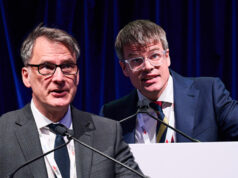Alison Halliday, St George’s, University of London, asked surgeons attending the European Vascular Course (EVC) in Maastricht at the end of February to consider signing up to be part of the ACST 2 study.
Following the first such study, ACST 2 will look to recruit at least 5,000 patients with asymptomatic carotid stenoses in whom to compare endarterectomy to stenting.
The ACST 1 study comprised a cohort of 3120. In order to facilitate the larger cohort, the second study has “streamlined” the workload associated with each patient. Patients will be eligible where both, physician and patient are uncertain as to which procedure is most suitable, but where the physician feels that surgical intervention is necessary on top of medical treatment. The patient must also be fit enough and willing to take part in five-year follow-up.
Any centre able to enlist a collaborating neurologist will be eligible.
See www.acst.org.uk for more details.
“A large trial,” said Halliday, “will at last mean reliable evidence will emerge.”
Ron Balm, Academisch Medisch Centrum, Universitaet van Amsterdam, presented the latest news from the Amsterdam Acute Aneurysm Trial.
The trial was established to test whether emergency endovascular repair of ruptured abdominal aortic aneurysm was preferable to open repair, in order to provide evidence to support the establishment of 24-hour endovascular facilities at hospitals in the region.
Following an extended inclusion period, Balm told delegates, by December 2008, the target of 80 patients randomised had been met.
“However,” he said, “we got scared! In early 2008 we started to wonder whether we had made the right assumptions in our power calculations.
“We were afraid that we’d end up with a trial that was just under power.”
The trial was therefore expanded to 120 patients, with an inclusion period extended October 2010. A final analysis is now expected in February 2011.













